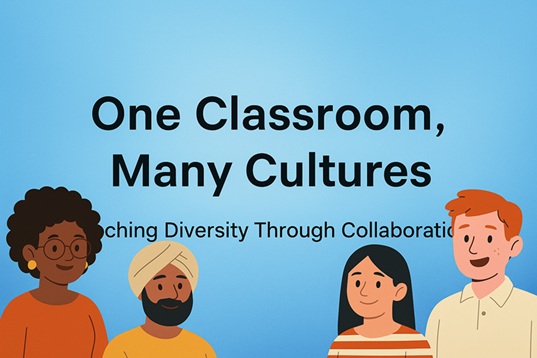One Classroom, Many Cultures – Teaching Diversity Through Collaboration
- Phd. Krisztina Dr. Neumayerné Streitman
- 35 lessons, 7 days
- English, B2
- 12 July 2026
The goal of this practice-oriented course is for participants to acquire skills and knowledge that will help them communicate and collaborate effectively across different cultures, both in the classroom and in life. During the training, participants will develop and deepen their intercultural competencies through group activities, intercultural games, simulations, case studies, films, and songs
Description:
During the training, we will define cultural intelligence and intercultural competence, and highlight their significance in teaching and real-life situations. We will cover the concept of culture and how to handle cultural misunderstandings. We will develop intercultural communication skills, including motivation, awareness, strategies, and both verbal and nonverbal cues. The training will address cultural knowledge such as topics on civilization, speech and behavior culture, and nonverbal communication. We will examine cultural dimensions, their impact on interactions, and the weaknesses, limitations, and applicational challenges of cultural models.
Additionally, we will discuss intercultural education, cultural adaptation, the cultural content of textbooks, and the role of tolerance. We will enhance communication styles across cultures. We will also explore the role of English as a lingua franca and the balance between linguistic accuracy and relationship sustainability. The course will conclude with reflection, SWOT analysis, and the development of a personalized action plan.
Aims and objectives:
The aim of the training is for participants to develop their intercultural competencies through practical experiences, including intercultural games, simulations, films, and songs. Building on interdisciplinary research, the course helps participants acquire the necessary awareness, expertise, and practical skills to become more effective in culturally diverse interactions, both in the classroom and in everyday life. Participants will analyze their own experiences based on various models to create a personalized development plan for effective communication and collaboration.
Learning outcomes:
- Understanding and Analyzing the Challenges of a VUCA World: Defining the concept of VUCA (Volatility, Uncertainty, Complexity, Ambiguity) so that participants can effectively address these challenges in the future.
- Defining Culture and Intercultural Competence: Participants will understand the importance of enculturation, which involves knowing one's own culture and values. This foundational knowledge leads to acculturation, enabling effective communication in various cultural contexts through the integration of other cultures.
- Recognizing and Managing Cultural Differences: Analyzing cultural dimensions and identifying practical examples of misunderstandings caused by cultural differences, along with solutions, to enable participants to handle similar situations both in the classroom and beyond.
- Developing Intercultural Communication: Practicing communication skills, particularly recognizing and applying intercultural communication preferences and styles, and enhancing empathy and tolerance, which are essential for their future work. This will be supported through intercultural games, simulations, case studies, films, and songs.
- Understanding Cultural Adaptation: Recognizing and practically managing the stages of cultural adaptation to help participants and their students effectively adjust to different cultural environments in both education and everyday life.
- Handling Communication Challenges in Education: Practically addressing challenges arising from using English as a lingua franca and applying the PARSNIP model in culturally diverse classrooms to promote better collaboration and communication in their future work. (PARSNIP: - Positive Thoughts and Words; - Age and Abilities; - Religion; - Ethnicities; - Cultures; - Sharing with Classmates; - Neighbors and Communities; - Individualities and Interests; - Peace and Kindness)
- Self-Reflection and Planning Future Development: Assessing personal communication and practical skills, developing self-awareness through reflective practices, conducting a SWOT analysis, and setting individual development goals that participants can integrate into their work and daily life.
Target groups: Teachers of any age, Heads of institutions
Please click here to register if you wish to participate in this course.


